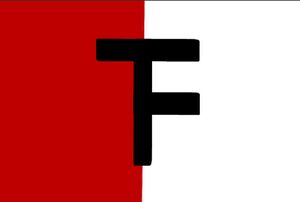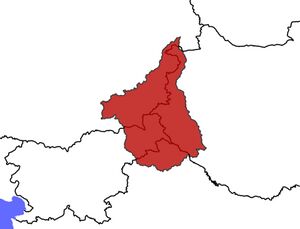Lāgsmān: Difference between revisions
Jukethatbox (talk | contribs) No edit summary |
Jukethatbox (talk | contribs) |
||
| Line 38: | Line 38: | ||
===Orthography=== | ===Orthography=== | ||
There are currently two orthographies used to write Lāgsmān- the Ghrāßa orthography, supported by the Akādami Ghrāßa situated in Austria, and the Szumbaatal orthography, supported by the Akaadami Szumbaatal situated in Hungary. Ghrāßa is heavily influenced by [[w:German language|German]] orthography, whereas Szumbaatal is heavily influenced by [[w:Hungarian language|Hungarian]] orthography. | There are currently two orthographies used to write Lāgsmān- the Ghrāßa orthography, supported by the Akādami Ghrāßa situated in Austria, and the Szumbaatal orthography, supported by the Akaadami Szumbaatal situated in Hungary. Ghrāßa is heavily influenced by [[w:German language|German]] orthography, whereas Szumbaatal is heavily influenced by [[w:Hungarian language|Hungarian]] orthography. | ||
Those who advocate for the Ghrāßa system, known as the ''Ghrāßarumuz'', claim that since Lāgsmān is a Germanic language, and also that other South Germanic languages such as [[Mudukris]] use a German-based orthography, they believe that Lāgsmān should also use a German-based orthography. | |||
Those who instead advocate for the Szumbaatal system, known as the ''Szumbaatalrumuz'', argue that as the majority of ethnic Lagsmen live in western Hungary, and that many learners of Lāgsmān as a second language are also Hungarian, Lāgsmān should accomodate for the majority and use a Hungarian-based orthography to minimise confusion among primarily Hungarian learners. | |||
===Consonants=== | ===Consonants=== | ||
Revision as of 23:40, 9 October 2023
This article is a construction site. This project is currently undergoing significant construction and/or revamp. By all means, take a look around, thank you. |
| Lāgsmān | |
|---|---|
| lāgsmān | |
 The Lāgsmānfinu, the flag of the Lagsmen. | |
| Pronunciation | [ˈlaːɣsˌmaːn] |
| Created by | Jukethatbox |
| Date | 2023 |
| Native to | "Lāgsmānland" |
| Native speakers | 400,000 (2023) |
Indo-European
| |
Early forms | Proto-Indo-European
|
Standard form | Ghrāßa(Graz) dialect
|
Dialects |
|
| Official status | |
Recognised minority language in | |
| Regulated by | Akādami Ghrāßa, Akaadami Szumbataal |
 The proposed borders of Lāgsmānland, based on ethnic and linguistic conposition. | |
Lāgsmān is a Germanic language(specifically of the fictional South Germanic family) spoken by the nomadic Lagsmen, who freely roam the area between Varaždin, Graz and Szombathely, colloquially known as the Lāgsmānland[1]. The endonym is a portmanteau of the Proto-Germanic word *hlaupanan, "to leap"(also the root of German laufen, to walk) and man, from Proto-Germanic *manwaz.
Introduction
The main idea around this language is just to make a really goofy Germanic language without straying from that root. So in a way, its kind of like a jokelang, but I genuinely plan on fleshing the language out.
Phonology
Orthography
There are currently two orthographies used to write Lāgsmān- the Ghrāßa orthography, supported by the Akādami Ghrāßa situated in Austria, and the Szumbaatal orthography, supported by the Akaadami Szumbaatal situated in Hungary. Ghrāßa is heavily influenced by German orthography, whereas Szumbaatal is heavily influenced by Hungarian orthography.
Those who advocate for the Ghrāßa system, known as the Ghrāßarumuz, claim that since Lāgsmān is a Germanic language, and also that other South Germanic languages such as Mudukris use a German-based orthography, they believe that Lāgsmān should also use a German-based orthography.
Those who instead advocate for the Szumbaatal system, known as the Szumbaatalrumuz, argue that as the majority of ethnic Lagsmen live in western Hungary, and that many learners of Lāgsmān as a second language are also Hungarian, Lāgsmān should accomodate for the majority and use a Hungarian-based orthography to minimise confusion among primarily Hungarian learners.
Consonants
Vowels
Prosody
Stress
Intonation
Phonotactics
Morphophonology
Morphology
Syntax
Constituent order
Noun phrase
Verb phrase
Sentence phrase
Dependent clauses
Example texts
Other resources
- ^ The Lāgsmānland is not a genuine nation-state, but the area is mostly united by ethnicity, culture and language, like Kurdistan. Of course, there are many who wish to see a Lāgsmānland nation-state, similar to Kurdistan, but the nationalistic sentiment is less widespread than Kurdistan. Kurdistana Azad!
